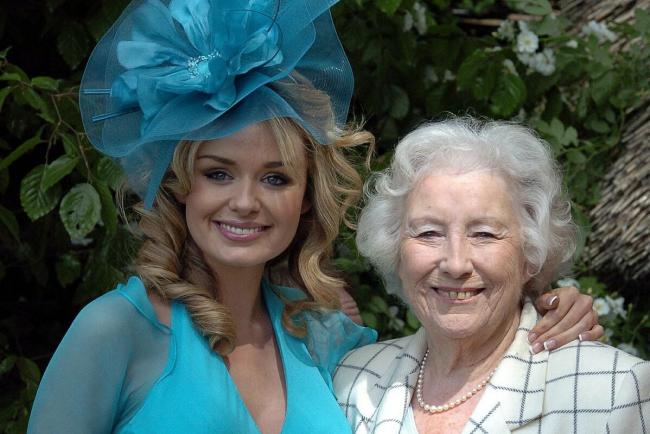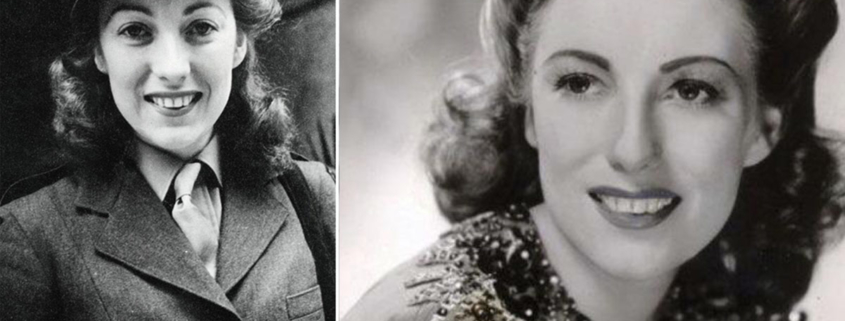Forces’ Sweetheart Dame Vera Lynn says Goodbye
Dame Vera Lynn peacefully passed away at her home in Sussex on June 18th 2020 surrounded by close family aged 103. She had remembered this year in May, just before the 75th anniversary of VE Day “the brave boys and what they sacrificed for us. They left their families and homes to fight for our freedom and many lost their lives trying to protect us and our liberties”. During her last interview, Dame Vera described her bond with the Allied troops who gave or risked their lives for their country – with her own war effort making her name as enduring as that of Sir Winston Churchill.
Celebrities and politicians lined up to pay tribute to Dame Vera, a humanitarian and beloved entertainer.
‘Dame Vera Lynn was one of the greatest ever British popular singers, not just because of her immaculate voice, warm, sincere, instantly recognisable and musically flawless. She will be remembered just as affectionately for her vital work in the Second World War and for her own Charitable Foundations in the 75 years since. A link with more certain times has been irrevocably broken.’ Said author and lyricist Sir Tim Rice. Born in east London on March 20th, 1917 Vera Lynn became known as the “forces’ sweetheart” during WWII, often performing at high personal risk for troops around the world including India, Egypt and Burma, and with songs that gave them hope that they would see home again.
Vera Lynn remained mostly in London until 1944 but then she made her famous tour of Burma to entertain the troops. She was stirred into action in her twenties, when she learned that few entertainers went to Burma, where the men of the Fourteenth had called themselves the Forgotten Army. Her four-month tour began in a Sunderland flying boat. She was then transferred to smaller aircrafts until arriving on the road from Rangoon to Mandalay in an old battered car.
Describing the experience later, she said it was ‘the trip of a lifetime’ and the smell that continued to haunt her most was the gangrene pervading the field hospitals where she spent hours talking with soldiers.
During that time she flew 25,000 miles and through her songs and talking to them about home she persuaded them that they were not forgotten. Vera Lynn was awarded the Burma Star in 1985 in honour of her contribution.
From year 1935 she was singing on radio with the famous Joe Loss Band. By 1937 she started to sing with the Ambrose Orchestra, which played in West End nightclubs including the Cafe Royal and the Mayfair, remaining until 1940.
At the outbreak of war she was just 21 years old and her career was just starting to bloom having already appeared on early, experimental television with the Ambrose Orchestra as well as producing regular broadcasts by radio.
Many years later she recounted that at that time on the outbreak of war one of her first thoughts was, ‘There goes entertainment – and my career with it’. It seemed to me then that entertainment would be the last thing people were going to worry about once the bombs started falling, but it turned out not to be the case at all.”
In 1940 Vera Lynn went solo. The following year she married Harry Lewis, a clarinet and saxophone player who also became her manager. Vera Lynn had already been awarded the title “Forces Sweetheart” in 1939. The competition included Judy Garland, Dinah Shore and Deanna Durbin who were all from the United States.
Vera Lynn was the overwhelming choice, helped by her new but catchy and sentimental song she had begun singing that year, We’ll Meet Again.
By November 1941 she was given her own regular radio programme, Sincerely Yours, which was broadcast after the Sunday evening nine o’clock news, a peak time which had much of the world listening in case the Prime Minister made an announcement.
She took over one of the largest and most intent audiences, jesting in an interview in later years: ‘Churchill was my opening act.’
The popularity of this music and words programme and her own standing soared, when thousands of servicemen wrote song requests to her. However, that popularity came at a surprising low point in the war when MPs and BBC governors attacked her programme and others like it as having a bad effect on “morale”.
A month after Sincerely Yours was launched, the BBC board of governors read: ‘Sincerely Yours deplored. But popularity noted.’ MPs had also complained about the BBC’s musical output of ‘sentimental, sloppy muck’. Without mentioning Dame Vera, the BBC introduced a new policy eliminating ‘crooning, sentimental numbers, drivelling words, slush and so on’. Sincerely Yours was taken off the air and a new programme featuring a military band, male voice choir and an unknown tenor replaced it, but lasted only a few weeks sinking into oblivion. By early 1943 Dame Vera was back again. People came to know her songs like well-loved hymns, including We’ll Meet Again, I’ll Be Seeing You, Wishing and If Only I Had Wings.
She was quoted as saying: ‘My songs reminded the boys of what they were really fighting for, precious personal things, rather than ideologies and theories.’
She retired from the stage and microphone to bring up her daughter Virginia at their home in Sussex when the war was over. But, with a vast following across the world she was soon back at work with her own television show in the 1950’s as well as back to radio broadcasts. She placed the first British record to top the US hit parade, selling more than 12 million copies to then tour throughout the world, to the US, Scandinavia, the Netherlands, Germany, Canada, New Zealand and Australia. Her work did not end when the war was over – throughout her life, she remained an outspoken supporter of military veterans.
She said: ‘I have never been terribly ambitious. I never wanted to be a Judy Garland or anything, and I wouldn’t change the way I used to sing. If work came along I liked, I would do it. If it interfered with home life for too long or took me away, I wouldn’t.’
Even though Vera Lynn was quite modest, she continued to receive honours including a DBE in 1975, following an OBE in 1969, Show Business Personality of 1975, the Freedom of the City of London in 1978 and the Variety Club International’s Humanitarian Award in 1985. In 2016 she was ‘surprisingly honoured’ to be made a Member of the Order of the Companions of Honour for services to entertainment and charity in the Queen’s Birthday Honours list.
Together with 14 gold discs she published her autobiography Vocal Refrain in 1975 and a picture book called We’ll Meet Again in 1991. Vera Lynn was honoured with a Lifetime Achievement Award at the age of 101 by the 2018 Classic Brit Awards, which her daughter Virginia collected on her behalf. A statement from Dame Vera was read at the ceremony.
It said: ‘I never imagined when a small child growing up in East Ham that I would be able to travel around the world as I have done, and seen and experienced so many interesting places and to meet so many interesting people.’
In June 2019, she marked the 75th anniversary of D-Day by recording a voice message which was played to a Royal British Legion cruise organised to commemorate the occasion. She told the 250 heroes on board: ‘Hello boys, Vera Lynn here. I wish you and your carers a memorable trip to Normandy. It will be nostalgic and sure to bring back lots of memories. Rest assured we will never forget all you did for us. I’m sending you all my best wishes for the trip.’
Queen Elizabeth II recently referred to one of Dame Vera’s wartime songs during her rare TV speech as she told Britain – with its 66 million people separated from family and friends during the coronavirus pandemic “We will meet again”. This song became a lockdown anthem as it once again entered the singles charts with profits going to the NHS charity and poignantly she performed the song virtually just six weeks ago. The veteran singer was beamed as a hologram to stand next to Katherine Jenkins at an empty Royal Albert Hall to mark the 75th anniversary of VE Day. Dame Vera became the oldest living artist to score a top 40 album in the UK charts last May.
Her songs inspired a spirit of optimism and she spent her career fostering nostalgia which, during the war, was just what people felt they needed. More recently, her words became a source of comfort to many during the coronavirus pandemic.
Singer Katherine Jenkins commented “It was she who chose the sentiments of her songs – she knew instinctively what people needed to hear, how to rally the morale and her spirit and strength created the soundtrack of a generation. Her voice brought comfort to millions in their darkest hours, her songs filled the nation’s hearts with hope, and her emotive performances, whether home or abroad, then or now, helped to get us through. “There will never be another Dame Vera Lynn. Forces’ Sweetheart and our sweetheart. An icon. A legend. An inspiration. My mentor and my friend. I will miss you greatly and I know we’ll meet again some sunny day.”
Source ©My Country magazine – July 2020 (pages 6-7)





